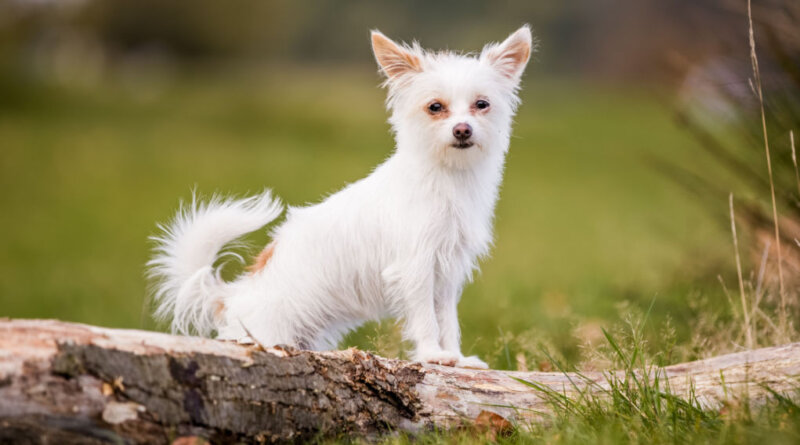Chorkie Dog Breed Profile – Top Dog Tips
Are you looking for a small-sized adorable canine companion to keep you company?
Do you want a dog that is equally affectionate, independent, and eager to please?
Introducing the Chorkie dog breed!
These adorable furry friends, known for their diminutive looks and playful attitude, are a cross-breed of the lively Chihuahua and brave Yorkshire Terrier.
It is a relatively new designer breed that was created to combine the innate traits of both its parents.
With the Chihuahua’s loyalty and Yorkshire Terrier’s intelligence, this energetic and spunky breed will quickly melt anyone’s heart.
So, whether you want to become a Chorkie pet parent or just want to learn more about this breed, welcome!
In this post, we’ll learn everything you need to know about this charming, including its looks and temperament, how to care for one, and whether a Chorkie dog will suit your needs.
So, without further ado, let’s get into it!
Chorkie Dog Breed Standard
Height and Weight
Chorkie dogs are small-sized pets that stand about 6-9 inches tall and weigh around 4 to 10 pounds.
While that is the average of this breed, some Chorkies may be smaller or larger than this range, depending on the genetics and nutrition provided.
It is important to remember that while these loveable pets may be fun-sized, they still require adequate physical and mental stimulation and a balanced diet for optimum health.
Coat
Chorkie dogs can have various coats, depending on the genetics transmitted through the Chihuahua parent.
Most Chorkies generally have a soft straight or wavy coat that is fine in texture.
It may range from short to medium in length, based on the unique genetic makeup of your adorable furry buddy.
Some Chorkies have unique patterns and markings on their chest and face that distinguish them from other dogs.
Temperament
Chorkie dogs are affectionate, intelligent, and eager to please their owners. They’re eager to learn and exhibit an enticing excitement toward life.
If you want a tiny snuggle buddy that provides comfort and cute aggression, a Chorkie will suit you well.
Its diminutive looks and captivating appearance will surely melt even the coldest hearts!
How to Care for Chorkie Dog Breed
1. Exercise
The amount and intensity of physical stimulation your Chorkie needs depends on age, size, and individual differences.
While they may seem small, these adorable dogs are highly energetic and require daily exercise for optimum physical and psychological health.
That is why we recommend a daily 30-minute walk or game time to release that pent-up energy and feel at ease.
That will also give you a wonderful opportunity to bond with your furry companion and spend quality time with them.
It’s also worth noting that not providing them with their much-needed physically and mentally challenging activities may make your adorable puppy bored and restless.
It may also lead to behavioral issues such as anxiety and excessive barking.
2. Training
Chorkie dogs are regarded as quite trainable, owing to the intelligence and flexibility of their parent breeds.
As a mix between Chihuahua and Yorkshire Terrier, these playful dogs inherit a range of traits from their parent breeds, including their affectionate temperament and readiness to learn.
They’re eager to please their owners, so they are receptive to your guidance and will follow whatever you teach them.
Their history as companion dogs means you get a snuggle buddy and a cheery friend, both in one small-sized frame.
But it is worth noting that these traits are not without a downside: independence and stubbornness.
While these are not negative qualities per se, they may turn into disobedience if not managed properly.
That is why we recommend using positive reinforcement techniques for habit formation. This includes rewarding your pet with treats, toys, or praise when they exhibit the desired behavior.
So, whenever your vigilant Chorkie acts the way you want it to, you’ll reward them with its favorite treat to further cement that habit!
Note: Chorkies can be susceptible to weight gain. So we recommend switching to low-calorie dog treats to ensure your dog stays healthy.
3. Grooming
Grooming constitutes an essential component of a dog’s physical and psychological well-being.
A well-groomed dog will likely look and feel better.
Here, we have an easy-to-follow checklist to keep your doggo handsome and feeling like the good boy that he is.
Brush its Hair Regularly
The Chorkie dog breed has a long, silky coat that needs frequent brushing to keep smooth and matt-free.
We recommend a weekly brushing session to ensure it stays healthy and nourished.
But you may switch to a more frequent schedule if your adorable furry buddy loves playing outdoors.
This will help reduce the accumulation of dirt and debris, keeping your doggo clean and thriving.
Bathe Every 4-6 Weeks
Regular bathing is crucial to a dog’s health. We recommend a monthly bathing session to ensure your dog stays clean and fresh.
Not doing so may make your furry companion smell bad, which may be unpleasant for both of you.
But you may delay it to 6 weeks if your pet is a homebody and doesn’t spend much time outdoors in the dirt or during the winters when it’s cold.
Trim Their Nails to Avoid Discomfort
Long nails can be a source of discomfort for the dog and owners alike.
They may accumulate dirt under their surface or scratch your arm or clothes while your dog plays with you.
So we recommend trimming your beloved Chorkie’s nails every 2-3 weeks to keep them an appropriate length.
4. Diet and Nutrition
Diet and nutrition play an essential component in your dog’s physical well-being.
Your Chorkie’s dietary intake should target two main health concerns: their small size and susceptibility to weight gain.
It should be packed with adequate proteins, healthy fats, and vegetables to keep your doggy feeling well-fed and healthy.
It is also important to remember that this amount may depend on your pet’s activity.
For example, a highly active Chorkie may require more food than its less-active counterpart.
We recommend separating the meal into multiple portions throughout the day. This means various smaller-sized food portions instead of one large-sized one.
This will enable your Chorkie to be well-nourished and active throughout the day, ensuring optimum health and performance.
5. Socialization
Did you know early socialization can significantly contribute to your adorable dog’s growth and development?
Yes, you heard that right! A pup consistently exposed to new surroundings, animals, and pets gets accustomed to them.
They are less likely to feel unsafe and will perceive the world beyond them as less of a threat.
On the other hand, a dog not socialized appropriately is likely to have a distorted perception of the world.
They may get scared and anxious and resort to excessive barking as a coping mechanism.
We recommend getting all socialization-related information from the breeder or organization where you get your dog.
Younger Chorkies offer the advantage of training them as per your lifestyle. But older Chorkies can make equally great companions once you’re acquainted with their upbringing.
We recommend seeking the assistance of a professional trainer if your pet exhibits signs of distress and behavioral issues.
They will have the necessary knowledge and expertise to accurately diagnose and provide an effective methodology targeting your Chorkie’s concerns.
Remember: You and your pet are a team. An open-minded attitude will likely assist in a helpful collaboration and foster love and trust on both ends!
Is Chorkie Dog a Good Choice for You?
Adopting a dog can be a tricky task. There’s a range of traits to look for, and then decide which breed suits you best.
For example, a Bichon Frise may be an adorable and loveable companion for a family living in a small apartment.
But it will be very ill-suited to an individual searching for a hunting dog to assist them in catching prey in the wilderness.
So understanding your unique needs is essential here.
Possessing mental clarity about what you want in your pet will enable you to sift through the vast expanse of potential choices and settle on one that best fits your personality and lifestyle.
Here, we have compiled a list of factors to help you decide if a Chorkie dog will be a good choice for you.
Remember: No dog is inherently good or bad. It’s all about your preferences and what you want in your loyal furry buddy.
Age and Maturity of Family Members
Do you live alone or with a family? What are the ages of the people living in your home?
Chorkie dogs are affectionate and playful dogs that love jumping on their owners as an expression of love.
They’re also quite friendly and would thrive in a family fulfilling their social needs.
This means the ideal household for a Chorkie dog will contain multiple people, so even if one individual leaves for work, there’s always someone to take care of them.
We already know that Chorkies are small in size.
For that purpose, we do not recommend them for families with small children who will accidentally injure your adorable pet while they’re simply having fun.
We suggest only adopting a Chorkie if your children are old enough to provide this breed with the delicate gentleness it needs.
Dog’s Level of Social Exposure
Remember when we said that a dog’s social exposure in puppyhood was essential for its growth and development?
Well, that can be a great determinant when deciding if the Chorkie you are adopting will be a good choice for you or not.
For example, suppose you are adopting a young Chorkie for your home. Now, the mind of such a puppy will be quite open to whatever you teach him.
His innocent mind will quickly grasp the instructions you give him. This means he will adjust to the norms of your home fairly early.
But things are slightly complicated when adopting an older Chorkie.
Taking a Chorkie that has yet to be socialized properly into a household may overwhelm them.
This may result in behavioral problems if you’re a novice owner and do not know the intricacies of the doggo language yet.
Lifestyle Compatibility
If you’ve adopted several dogs during your lifetime and are equipped with the necessary information, you’re good to go.
But for all novice owners, here’s a quick tip: Analyze your home and environment from the perspective of the dog you are adopting.
We already know that Chorkies are small-sized energetic dogs. This means a cozy apartment that is free from all potential dangers.
Are there any sharp edges you need to look out for? Are there any small secret passageways that your pet may escape from?
Do you own any other animals? How big are they?
Getting a Chorkie while you own a large-sized pet may be a problem because of the difference in the power dynamic.
Your previous pet may feel threatened and pick on your adorable Chorkie—which may not have the physical strength to fight back.
These are just some essential factors to consider while getting a Chorkie.
Again, it all boils down to you, your needs, and your accustomed lifestyle.
A Chorkie is a wonderful choice for anyone with the time and energy to give them the love and care they need!
Chorkie Dog Breed: Conclusion
Getting a dog may seem intimidating at first.
There are too many choices to select from, and each one seems equally adorable and regal. But that is why understanding your needs is the first step here.
Getting a Chorkie means a lifetime of unconditional love and emotional support from your furry best friend.
This cute breed is incredibly loyal and devoted to its owners, which makes them highly trainable.
So, you’ll be getting a loveable cuddle buddy and an innocent friend in one small frame.
All you need to be mindful of is making your home safe before bringing your Chorkie in.
Pretending you’re a small puppy and staring at your surroundings from that perspective may help you identify potential hazards. And that’s it!
Have a great time with your Chorkie as they brighten the colors of your life!
READ NEXT: Shorkie Dog Breed Profile







